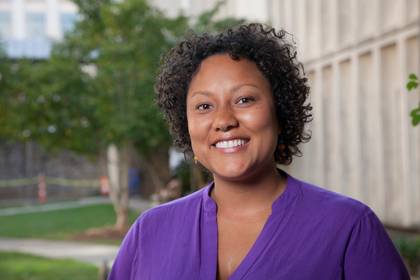
The first time Gianna Hammer took introductory biology she sat in the back and fought off distraction from sleeping classmates. The second time around, she got hooked and started on a track that has her studying the complex playbook of the mammalian immune system.
That playbook's quarterback is the dendritic cell, the focus of the new assistant professor of immunology's research. These cells were first described more than a century ago, but their fundamental importance in the immune system has been established only in the past three decades. In 2011, Ralph Steinman of Rockefeller University received the Nobel Prize for medicine for his study of these cells' role as "gatekeepers of the immune system."
The immune system is incredibly complicated, but Hammer said researchers recognize that dendritic cells' versatility make it central to understanding both how to fix the immune system when it goes wrong, as in autoimmune disease, and how to boost it when the body is under attack from viruses, bacteria and tumors.
"I know I've moved to a basketball community, but football is my sport of choice, so I like to use football analogies," Hammer said. "First, dendritic cells are like the defensive linemen. They hunt down the pathogen and tackle it. They are also the quarterback in that they call the plays. And then they are also like the head coach in that they direct the actions of the other players -- the T cells and the B cells and the rest of the immune system.
"Many cells can raise the alarm and do their best to fight off the invader. However, only dendritic cells can raise the alarm and activate T cells and B cells."
Hammer comes to Duke with a Ph.D. from the University of California at Berkeley and following a post-doc at the University of California - San Francisco, where as a Damon Runyon Fellow, she studied how to boost the immune system against cancer. (See video below).
At Duke, her current research focuses on the breakdown of the immune system, specifically resulting in inflammatory bowel disease. This research gets at a central paradox of the immune system: While it's designed to attack foreign invaders, our gut is lined with millions of symbiotic bacteria doing necessary and beneficial work. Under normal conditions, these bacteria are left untouched by the immune system.
In inflammatory bowel disease, dendritic cells' playcalling gets messed up, leading the immune system to launch an attack on gut bacteria, Hammer said. Using mice with certain genes knocked out, Hammer hopes to determine what genes instruct dendritic cells' interaction with intestinal microbes and corrupts these cells' decision making.
"My research has determined that dendritic cells require the protein A20 to suppress their responses to normal gut bacteria," she said. "Without this suppression, dendritic cells activate immune cells to attack bacteria in the intestine, which is exactly what drives inflammatory bowel disease."
Her path to Duke started enough with an unimpressive experience in introductory biology class at Eastern Washington University. The Spokane native entered college at age 16 and said in her youth she "didn't know how to work her way around college."
The 8 a.m. biology class turned out to be a mistake. Often arriving late for the large class, she usually sat in the back surrounded by sleeping or desultory students. She still doesn't remember what grade she received.
A year later she signed up for another biology class, and the first sessions seemed familiar. After talking with the professor, she realized she had mistakenly signed up for the same class she took a year before.
"This time I got interested," she said.
That summer she started doing bench science, working in a lab at Washington State University. "I immediately fell in love with the tools of science. I was surrounded by all the instruments that allowed people to discover the things I had studied in class. I wrote long paragraphs about how the instruments worked and how the process was done. That process of discovery excited me."
In graduate school and in postdoc work she learned that "rewards in bench science come with challenges and failure."
"I think one of the roles of the faculty is to teach graduate students to keep the eye on the prize and to work through those challenges. I look forward to working with both graduate students and undergraduate students in the lab. There are plenty of institutions where you can do science without students. One of the things that attracted me to Duke was the opportunity to work with students."
To interview for the Duke position, Hammer travelled across the continent this past winter with a five-week old baby. Now she's settled in Durham with her daughter, now seven months old, and is learning about being a mother. "She loves being in the carrier, so whenever there's a pretty day we're exploring Umstead Park and other outdoor spaces."